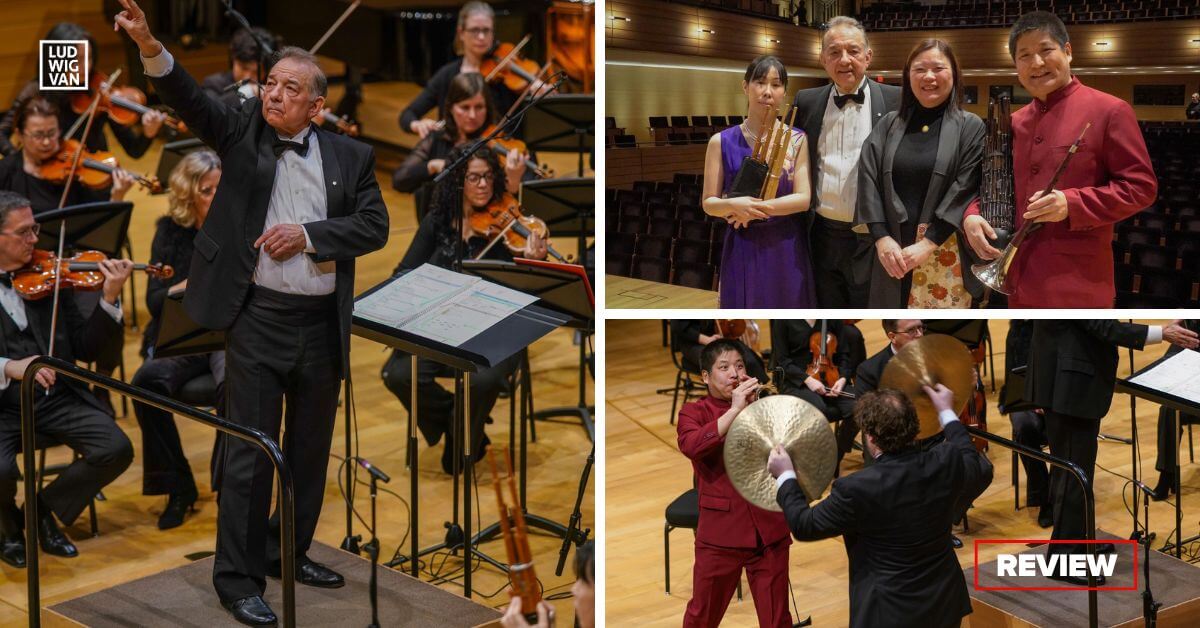
Misato Mochizuki [Japan] Nigredo (2009/rev.2018); Unsuk Chin [South Korea / Germany] Operascope (2023); Rita Ueda [Canada] Birds Calling…From the Canada in You (2022); Esprit Orchestra, Alex Pauk, conductor. Koerner Hall, January 24, 2024.
Founded in 1983 by Alex Pauk, Esprit Orchestra has the distinction of being the only full-sized orchestra in Canada devoted to performing and promoting new orchestral music, according to the Canadian Encyclopedia. It’s often said that classical music makes up a tiny one percent of the entertainment dollar. Given that contemporary classical’s share of that tiny slice of the pie is miniscule, it’s a testament to the vision, resilience and determination of its founder Maestro Pauk to keep Esprit Orchestra going, now in its 41st season.
New works are commissioned and premiered by EO each season, and there have been radio broadcasts and recordings, as well as the occasional touring, including an important one to China in 2015 that coincided with the 40th anniversary of Canada-China diplomatic relations. I confess that over the years, my attendance of Esprit performances had been spotty, the main reason being my rather traditionalist preference when it comes to classical music. I have since attended more in recent seasons, often at the invitation of Canadian composer Alexina Louie.
I was particularly intrigued with THREE, the first Esprit concert of 2024. On the program were works by three women composers — Misato Mochizuki (Japan), Unsuk Chin (Korea), and Rita Ueda (Canada). Of the three, I was only familiar with the music of Maestra Chin, whose opera Alice in Wonderland I saw in one of my frequent trips to the Munich Opera Festival a good 15 years ago.
Perhaps indicative of her affinity for the operatic genre, Chin is quoted in the program that her Operascope (2023), an Esprit co-commission, is intended to “refer to the history of opera…” All in ten minutes? Without any voices? It struck me as an overly ambitious statement to be honest, but I was willing to keep an open mind. While I cannot pinpoint any direct operatic quotations in a first hearing, I do find the piece to be sonically dramatic, in keeping with the spirit of opera.
The work by Misato is quite different, with dynamic levels that ranging from a haunting, rather eerie sounds to moments of cacophony, slithering sonorities, and other sounds that recall the natural world. I must say its intended reference to Jungian philosophy eluded me. Sitting in the audience, listening to this 19-minute piece, I kept thinking how difficult it would be to learn and memorize a work such as this, so kudos to the Esprit musicians.
While I do find the above two works interesting and thought provoking, it was the composition by Canadian composer Rita Ueda that I enjoyed the most — “Birds Calling…From the Canada in You.” For some 30 minutes, I was transfixed by the sounds coming from the stage. Correction: not just the stage but all around us in the balconies, where musicians were strategically placed. There were moments when conductor Alex Pauk were cueing musicians from the balconies. True to the title, this piece is all about sounds of nature as reproduced by the extra solo instruments used — the Sho played by Naomi Sato, and the Sheng and Suona played by Zhongxi Wu.
The sound of the Sho is rather ethereal and other worldly, although quite limited in dynamic range and volume. I was more impressed by the huge volume and intensity of the Sheng. There were moments that my ears were ringing! And not just mine as I saw a couple of people in the audience plugging theirs. Most impressive of all were the bird sounds made by the Sheng, an instrument that is totally evocative of nature. I found myself transfixed by it.
As a traditionalist when it comes to music — some might consider me an old fogey — I have always thought that using Western musical instruments to produce extramusical sounds, like rustling leaves, gusting winds et cetera, instead of the sounds these instruments are built to produce, is somehow artificial and contrived.
At this concert, I have come around to the idea that there is nothing “natural” about the musical notes as we know them. Music, and musical instruments, are simply forms of human expression across cultures, a concept we accept in anthropology. New Music in all its forms is every bit as valid human expression as Bach, Beethoven and Brahms. As a trained anthropologist, I should have known better all along, but I didn’t, probably because of the strong Western musical training in my early years.
A musical epiphany at Koerner Hall? Well, chalk one up to experience,
Are you looking to promote an event? Have a news tip? Need to know the best events happening this weekend? Send us a note.
#LUDWIGVAN
Get the daily arts news straight to your inbox.



